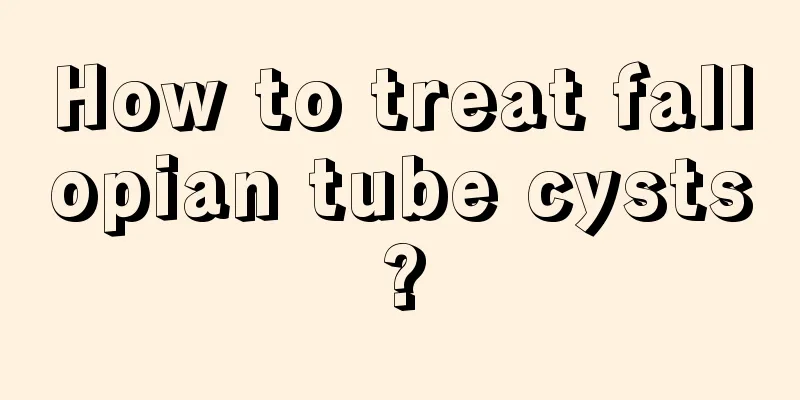How to treat fallopian tube cysts?

|
Women often suffer from some gynecological diseases. Some of these gynecological diseases are inflammations, such as vulvitis, cervicitis, pelvic inflammatory disease, etc. There are also some cysts, such as cervical cysts, vaginal cysts, adnexal cysts, uterine cysts, fallopian tube cysts, etc. No matter which disease it is, it must be actively treated, because these diseases will not only make women feel uncomfortable, but may also cause infertility or even malignant changes. So, how should we treat fallopian tube cysts? Fallopian tube cyst is a type of adnexal cyst, which is mostly caused by inflammatory stimulation. If the cyst is relatively small, no surgical treatment is required and it can be closely observed. If the growth rate is relatively fast, surgical treatment should be considered. Surgical method Laparoscopic salpingostomy surgery first fully frees the adhesions between the fallopian tube and other tissues. The fallopian tube is insulated through the cervix to expand the distal atretic fimbria of the fallopian tube, and the fallopian tube is fixed to the fundus of the uterus with non-destructive forceps. Whenever possible, make a cross incision at the original fallopian tube opening using a carbon dioxide laser or microscissors. If the original opening cannot be identified, a "cross" incision can be made in the thinnest avascular area of the fallopian tube wall. Place the grasping forceps into the incision and open and close it several times until the incision is the desired size. The incision should be made towards the ovary as much as possible to facilitate egg collection in the future. Use atraumatic forceps to grasp the fallopian tube lining at the new incision and turn it outward. In order to keep the incised valve in an everted state and prevent the new incision from adhering again, the serosal surface of the newly incised valve can be treated with a defocused laser or low-power micro-bipolar electrocoagulation. The surface tissue shrinks to achieve the purpose of everting the incision edge. You can also use 4-0 absorbable sutures to directly suture the everted valve to the serosa of the fallopian tube. During the operation, the wound was continuously irrigated with heparin-containing Ringer's lactate solution (5000U/L). After the operation, lactated Ringer's solution, sodium hyaluronate, antibiotics, corticosteroids, antispasmodics and other drugs can be placed in the pelvic cavity to prevent adhesion. If a cyst appears in the fallopian tube, you should pay attention to check and see the size of the cyst. If the cyst is very small and there are no discomfort symptoms in the body, it generally does not need to be treated and just regular checks are sufficient. If the cyst is large or grows rapidly, it needs treatment, and the most common treatment method is surgery. |
<<: What should I pay attention to before and after getting the ring?
>>: What are the symptoms of cervical cysts?
Recommend
What to eat to prevent hair loss? What to do if you lose hair in autumn
Many friends know that food supplements are worse...
Pus-like discharge from nipple
Each of us has nipples, but they often have some ...
What to do when you burp during pregnancy
Pregnant mothers will have some abnormal reaction...
What kind of underwear should I wear if I have breast hyperplasia?
The most important thing about breast hyperplasia...
Why do I have yellow discharge more than 40 days after a caesarean section?
As cesarean section technology becomes more and m...
Facebook Messenger reaches 1.2 billion monthly active users
WeChat is a popular instant messaging product in ...
What is the cause of vaginal discharge?
Discharge from the vagina may be a condition that...
Vaginal leucorrhea with tofu residue
Key reminder: Under normal circumstances, the sec...
Stay away from "mouse hand", don't miss these methods
"Mouse hand" is a common disease nowada...
How to treat incomplete septate uterus?
At present, many female friends are facing the tr...
The pain in the thigh root is the pelvic floor.
After nearly ten months of hard work, the moment ...
Do women snore, too? And more than men? The reason is revealed!
Audit expert: Wu Xi Associate Chief Physician, De...
Omdia: Global smartphone shipments will reach 1.223 billion units in 2024, a year-on-year increase of 7.1%
According to recent news, market research firm Om...
There is a big difference between CC cream and primer, don’t confuse them anymore!
Loving beauty is everyone's nature. Putting o...
What diseases can cause white vaginal opening?
The normal vaginal opening is pink, and some will...









